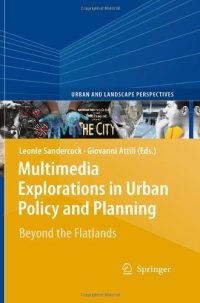
Ebook: Multimedia Explorations in Urban Policy and Planning: Beyond the Flatlands
- Genre: Other Social Sciences // Politics
- Tags: Human Geography, Landscape/Regional and Urban Planning, Regional and Cultural Studies
- Series: Urban and Landscape Perspectives 7
- Year: 2010
- Publisher: Springer Netherlands
- Edition: 1
- Language: English
- pdf
This book explores the potential of multimedia to enrich and transform the planning field. By ‘multimedia’ the authors refer to the combination of multiple contents (both traditional and digital: texts, still images, animations, audio and video productions) and interactive platforms (offline interactive cd roms, online websites and forums, digital environments) which are opening up new possibilities in planning practice, pedagogy and research. The authors document the ways in which multimedia can expand the language of planning and the creativity of planners; can evoke the lived experience (the spirit, memories, desires) of the mongrel cities of the 21st century by engaging with stories and storytelling; and can help democratize planning processes.
The diverse contributions demonstrate multimedia’s potential for layered, complex and open-ended representations of urban life; for enabling multiple forms of voice, participation and empowerment; for stimulating dialogue and influencing policy; for nurturing community engagement and community development; for expanding the horizons of qualitative and quantitative research; and for transformative learning experiences.
The book conveys an excitement about the ways in which multimedia can be used by activists, immigrant and indigenous communities, planning scholars and educators, wherever urban policy and planning strategies are being debated and communities are struggling to shape, improve or protect their life spaces. But the authors go beyond enthusiasm for the new, incorporating a critical stance about the power relations embedded in these new information and communication technologies; raising questions about audience and political intentions; and outlining ethical dilemmas around authorship and ownership, collaborative processes, and the politics of voice.
Leonie Sandercock is the author of eleven books, including Towards Cosmopolis: Planning for Multicultural Cities (1998) and Cosmopolis 2: Mongrel Cities of the 21st Century (2003). The latter won the Paul Davidoff Award for best book from the American Collegiate Schools of Planning. She also received the Dale Prize for community engagement (2005) and the BMW Award for Intercultural Learning (2007).
Giovanni Attili is the recipient of the G. Ferraro Award for Best Urban Planning PhD Thesis in Italy in 2005. He is co-editor of Storie di Citta (2007) and author of La citta dei migranti (2008), and co-author, with Leonie Sandercock, of the book and DVD package Where Strangers become Neighbours: Integrating Immigrants in Vancouver, Canada (2009).
The book is a collection of essays exploring the potential of multimedia to enrich and transform the planning field. By multimedia the authors refer to a broad range of new information and communication technologies (from film and video to digital ethnography and the internet), which are opening up new possibilities in planning practices, processes, pedagogy and research. The authors document the ways in which these ICTs can expand the language of planning and the creativity of planners; can evoke the lived experience (the spirit, memories, desires) of our 21st century mongrel cities by engaging with stories and storytelling; and can democratise planning practices. The text is epistemologically radical, in presenting an argument for the importance of "multiple languages" (ways of knowing) in the planning field, and making the connection between this epistemology and the almost infinite potential of Multimedia to provide varied tools to accomplish this transformation, displacing the supremacy of the rational, linear and hierarchical with more open, playful and imaginative approaches. Each of the authors brings practical experience with different forms of Multimedia use and reflects on the different potentialities offered by Multimedia for critical intervention in urban and regional issues, and the power dynamics embedded in such interventions.